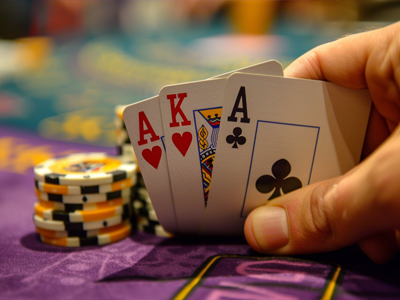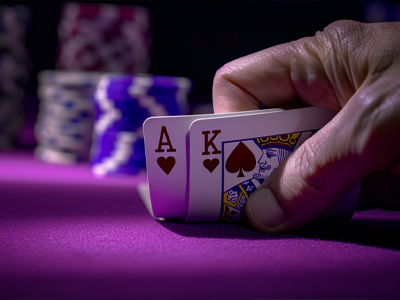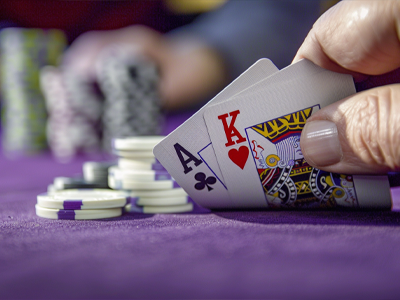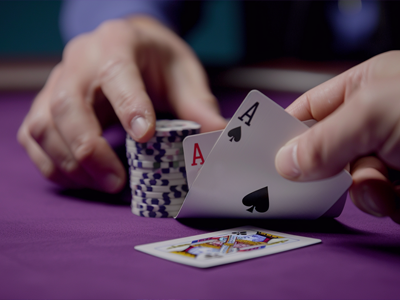I’ll admit I haven’t studied much PLO in my life, but enough to hold my own in the softer side of games. That’s exactly where I found myself over the past couple of weeks, playing some microstake PLO cash games. A friend had asked me for strategy advice for them and, having been away from
Category: Poker Strategy
Maintaining Focus and Discipline During Long PLO Sessions
When you know when to step back, you can stay sharp for the entirety of the PLO session Maintaining focus and discipline during long Pot-Limit Omaha (PLO) sessions can be a challenge, given the game’s fast pace and the mental energy required to handle multiple hand possibilities. A key strategy to stay sharp through hours
Capitalizing on Bubble Pressure as a Big Stack in Texas Hold’em
The bubble is a great time for a big stack to accumulate chips if you follow a few guidelines In Texas Hold’em, the bubble stage is a critical point in tournaments, where only a few players need to be eliminated for the remaining participants to reach the money. As a big stack, this is an
The Psychological Element of Playing with Middle Pocket Pairs in Texas Hold’em
Keeping a calm demeanor and making rational decisions is essential in poker Playing middle pocket pairs in Texas Hold’em introduces a distinct psychological challenge that requires a balance of confidence, caution, and strategy. These hands, often seen as tricky, include pocket pairs ranging from sevens to tens. While they can hold considerable value, they are
Combining Flush Draws With Other Strong Hands in Texas Hold’em
Combining flush draws with other strong hands can give you an edge at the tables Combining a flush draw with other strong hands in Texas Hold’em can be a powerful strategy that increases your chances of winning a pot. When you have a flush draw, you’re typically looking for one more card of the same
Adjusting Your Starting Hand Requirements in Texas Hold’em Freerolls
Flexibility and timing separate the average players from those who consistently make deep runs In Texas Hold’em freerolls, adjusting your starting hand requirements is crucial for long-term success. Freerolls are tournaments with no entry fee, attracting a large number of players with varying skill levels. This creates an unpredictable environment, requiring flexible strategies, particularly when
Poker Is Harder Than The Stock Market
There’s a viral article making its rounds around the poker world that outlines all the ways playing poker is similar to stock market investing. And while it’s certainly true that both share key attributes such as the need for risk-management and being a zero-sum game, the discussion misses a key factor that makes poker playing
The Importance of Readjusting After Losing a Big Pot in PLO
Staying disciplined and waiting for the right spots will give you the best chance to gain momentum Losing a big pot in Pot-Limit Omaha (PLO) can be a gut-wrenching experience, but how a player reacts afterward is critical to their overall success. PLO is a high-variance game, and even skilled players will face swings. It’s
Adjusting Your Betting Size Based on Bubble Considerations in Texas Hold’em
Adapting to the bubble pressure can be the difference between just surviving and going deeper In Texas Hold’em tournaments, the “bubble” is a critical point where only a few players need to be eliminated before the remaining field reaches the payout. This moment requires thoughtful adjustments to betting size, as playing recklessly or too conservatively
Managing Your Bankroll When Incorporating Middle Pocket Pairs in Texas Hold’em
Middle pocket pairs can be profitable, but only if you know when to fold and keep your losses in check Managing your bankroll is crucial when playing Texas Hold’em, especially when you start incorporating middle pocket pairs into your strategy. These hands, like 7-7 through 10-10, can be tricky to play. While they offer decent
Extracting Maximum Value From Opponents Holding Lesser Flushes in Texas Hold’em
Use consistent, gradual betting to make your opponents feel secure in their hands In Texas Hold’em, one of the most satisfying moments is when you realize you have a strong flush and suspect your opponent holds a weaker one. Extracting maximum value from such a situation requires both finesse and an understanding of your opponent’s
Why Playing Small Ball May Be the Best Winning Strategy for Texas Hold’em Freerolls
The small ball strategy keeps you patient, conserves your chips, and helps you survive Playing “small ball” in Texas Hold’em is often seen as a solid strategy, especially in freeroll tournaments where players compete for prizes without having to pay an entry fee. The core idea behind small ball is to play conservatively, minimize risk,













